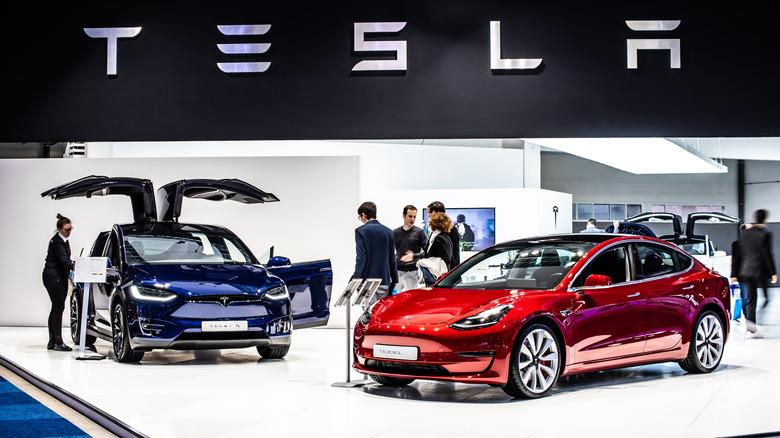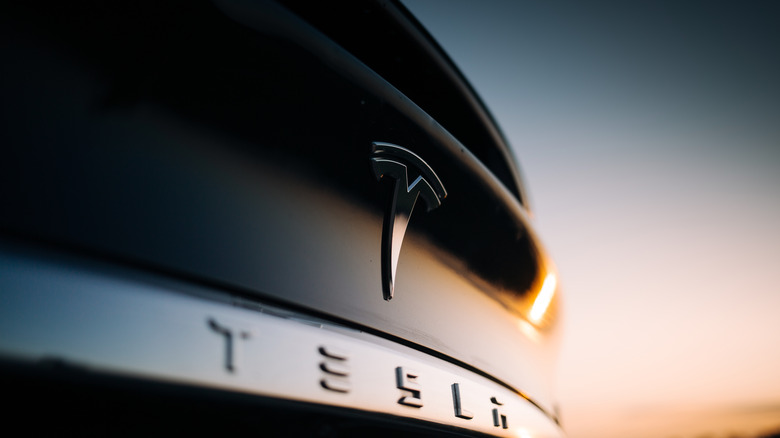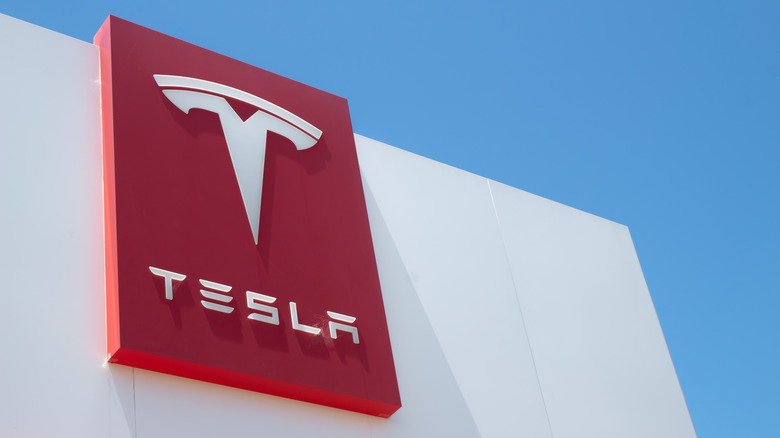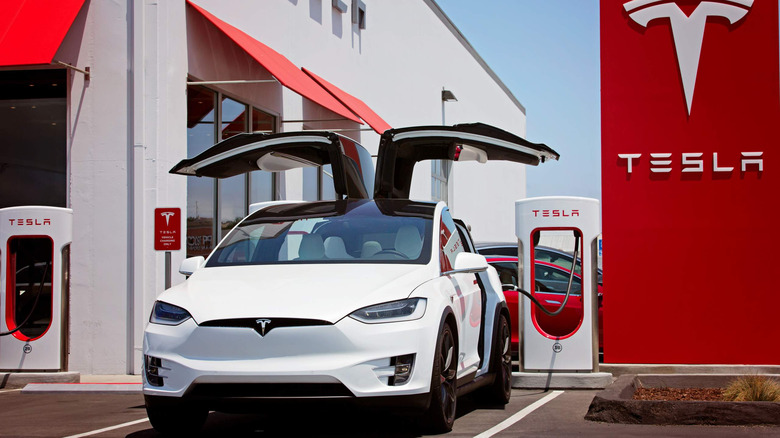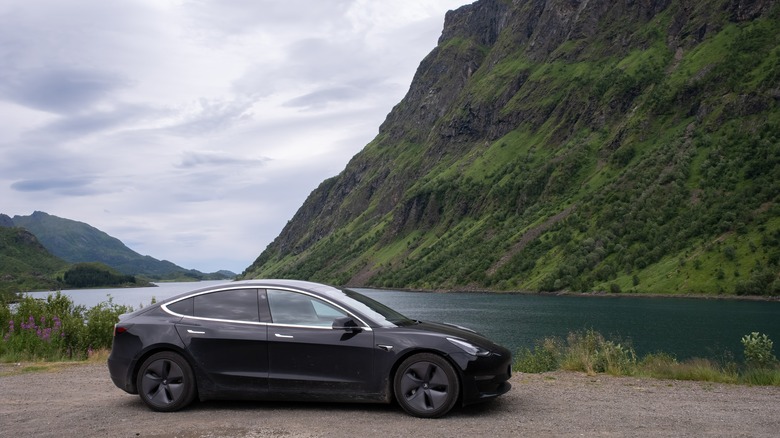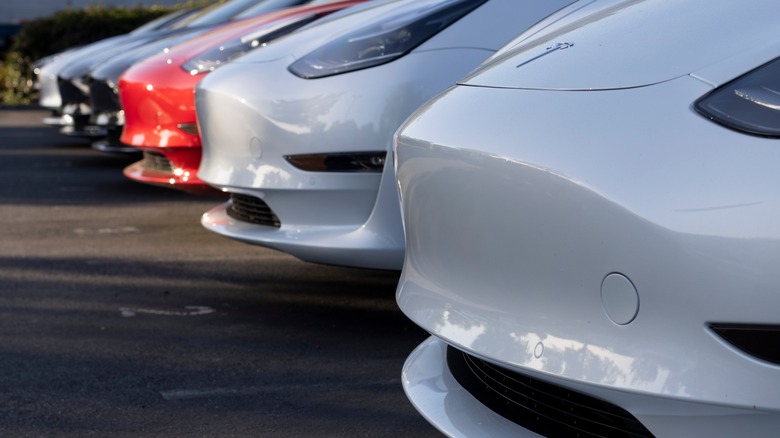5 Big Reasons Why You Should Stay Away From The Tesla Model X
The Tesla Model X is an exciting addition to the automotive world. Tesla vehicles have been a staple component of the electric vehicle marketplace for over a decade, and Tesla is consistently found at the bleeding edge of innovation and style in this space. However, there are some major drawbacks that come along with a Tesla, and the new Model X is no different. Aside from the price tag of a Tesla, there are actually a number of reasons why these cars don't stand up to the test of time in the same way that some other cars might.
U.S. News & World Report notes that the Tesla Model X will run you roughly $115,000 — a significant premium to be sure. For this immense price tag, you might expect to drive away an enormously luxurious, high performance vehicle. However, the truth is that while Teslas provide a cutting edge driving experience to their owners, the Tesla Model X leaves a lot to be desired even with the power of its brand name behind it — and this enormous price tag that should signal luxury and performance to buyers.
This isn't to say that the Model X should be avoided by everyone in the market for a new EV. Understanding the full picture can help you make a smarter decision when it comes to purchasing a new car, especially one that's this expensive.
Tesla vehicles experience a growing number of recalls
Recalls are a common problem in the car industry, regardless of the make or model of car that you drive. Recall issues will always exist, and typical problems that need to be addressed are not a major concern for car owners. However, Tesla as a brand has been experiencing a high volume of recall issues in the last few years. At the end of 2021, Tesla was forced to recall almost 500,000 vehicles as a result of autopilot malfunctions (via Reuters). Tesla has also had to recall vehicles over fire concerns, too, according to The Street. Often, a recall will involve a minor sensor or light trouble, or more substantial issues surrounding air bag deployment, braking trouble, or other similar features. But when cars or catching on fire and pedestrian safety is jeopardized, there is some serious cause for concern.
This isn't just a quirky feature or potentially annoying trouble in the startup sequence or entertainment setup. Major safety concerns are cause for massive recalls and can shake consumer confidence in the brand itself. This is no different with the Tesla Model X and other Tesla vehicles. There have been recent issues with rear view cameras, hood and trunk latch problems, and more in addition to these serious safety concerns. Consumers in the market for a new EV might want to look elsewhere in order to give Tesla the time it needs to solve the major challenges that it faces.
You can't test drive a Tesla before buying
One significant problem with the Tesla sales model is that you don't have the ability to test drive a vehicle before you purchase it, according to users of the Tesla Motors Club site. Some consumer arenas operate in this manner, for instance at a restaurant you can't sample a number of different dishes before deciding to order one. However, there is a major difference between $13 plate of spaghetti and a $100,000 car. Because Teslas are purchased through the use of the brand's app (via Tesla), buyers aren't necessarily able to even view a Tesla automobile in person before making this commitment to purchase one.
Teslas have been featured in malls and other outlets in the past, and it is possible that there will be one located in your area, but this isn't a given. A test drive is potentially out of the question even if you're able to go and inspect a Tesla Model X in person.
Many of the integrated features in cars these days are fairly similar across platforms and brands. Every car has an entertainment system, most incorporate features like fog lights and cruise control, and many modern automobiles come equipped with Bluetooth connectivity and other personalizing touches. This means that the determining factor often comes down to the way the car handles the road and responds under your control. But without the ability to inspect these qualities on a Tesla, drivers are often made to take the plunge blind, and hope that it works out for the best.
More demand has led to lower vehicle quality control standards
In recent years, Tesla has boosted its output of completed cars to be sold in the global marketplace. As a result, some drivers have noticed a change in what can only be described as the quality control standards (via Road and Track). Tesla cars are coming off the line with scratched or chipped paint, problematic electronics, and even trim work that isn't completely aligned or cut properly to fit.
Quality control is important for any kind of product that a consumer might purchase. But naturally, the more expensive a product is, the higher a buyer's expectation will be that every little detail has been accounted for in the finished product. Tesla standards for the Model X (and for many other vehicles that the brand produces) have become somewhat lax as of late, according to Road and Track. This has led to a big question mark moving forward for those thinking of investing in a Tesla Model X. This issue may not continue long into the future, but for now, concerns over the quality of Tesla's output remain.
Another related issue lies in the fact that Tesla drivers have noticed sudden losses in power while using their vehicles on the roadway (via NotebookCheck). Whether power loss affects your ability to drive or control the car while moving, or just the entertainment system, this problem is a significant one that speaks volumes about the standard of production across Tesla's range — not just in the Model X.
Cold weather driving is severely hampered in a Tesla
In addition to quality control issues, there are some concerns about the brand's long-term battery performance. EV batteries perform notably worse in cold weather, according to Mer and Leasing. But Tesla's batteries seem to diminish in their capacity faster than competitors, with Forbes noting a dramatic reduction in output during the winter.
This is a particular problem for those living in northern regions because the winter is longer and colder in certain parts of the country. The Tesla Roadside Assistance program won't cover a depleted battery either, so you can't expect to call for help if your battery dies — either as a result of a failure to charge the vehicle, or through an unexpected drop in performance because of the weather that you're driving in.
These woes combine to give buyers a significant question mark when it comes to purchasing Tesla over a different EV manufacturer's product. Cold weather driving is a noted problem across the EV marketplace, and this issue isn't just specific to Tesla. But there is good news on this front. EV manufacturers and battery makers on the whole have been working tirelessly for years to improve the range and efficiency of these battery packs in cold weather conditions, and GreenCars notes that breakthroughs in the technology seem to be on the horizon.
Tesla's customer service is lacking
Lastly, and perhaps most importantly for some drivers, is the fact that Tesla's customer service lags behind in professionalism and effectiveness. Drivers have reported problems with the individual customer service representatives they've worked with, as well as the available solutions to their specific problems, according to Business Insider. For one thing, Tesla does not make replacement parts for certain elements of the vehicle. This means that drivers will have to replace large, combination pieces if they want a solution to a small dent or part failure that may occur in the car. Customer service is an important part of any retailer's aftermarket branding efforts. But Tesla appears to have focused all of its efforts on the research and development companies of their automaking processes, and left the aftermarket service as simply an afterthought when it comes to taking care of customers' needs and building long term relationships.
The truth is that many other EV brands have built cars that perform incredibly well on roadways. In the early days of electric vehicle use, Tesla was a household name, and no other player came close to the prowess of these models. But today, Tesla has been joined by a long list of competitors who can do certain aspects of the automotive relationship much better than Tesla. Owning a Tesla may be the right path for you, but thinking twice before taking the plunge is always worth it.
